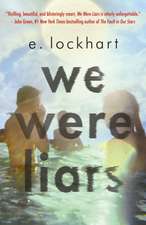The Little Friend
Autor Donna Tartten Limba Engleză Paperback – 5 iun 2005
| Toate formatele și edițiile | Preț | Express |
|---|---|---|
| Paperback (2) | 56.24 lei 3-5 săpt. | +31.67 lei 7-13 zile |
| Bloomsbury Publishing – 5 iun 2005 | 56.24 lei 3-5 săpt. | +31.67 lei 7-13 zile |
| Vintage Publishing – 30 sep 2003 | 110.75 lei 3-5 săpt. |
Preț: 56.24 lei
Preț vechi: 71.59 lei
-21% Nou
10.76€ • 11.51$ • 8.97£
Carte disponibilă
Livrare economică 27 martie-10 aprilie
Livrare express 13-19 martie pentru 41.66 lei
Specificații
ISBN-10: 0747573646
Pagini: 576
Dimensiuni: 129 x 198 x 40 mm
Greutate: 0.4 kg
Editura: Bloomsbury Publishing
Colecția Bloomsbury Paperbacks
Locul publicării:London, United Kingdom
Caracteristici
Notă biografică
Recenzii
'You will rarely have read better ... Because of Tartt's mastery of suspense, this book will grip readers all the way through to its bitter end'
'Tartt's grip on this billowing plot is glue-like and her ability to evoke the Deep South of last century exceptional ... excellent, enthralling'
'Destined to become a special kind of classic - a book that precocious young readers pluck from their parents' shelves and devour with surreptitious eagerness, thrilled to discover a writer who seems at once to read their minds and to offer up the sweet-and-sour fruits of exotic, forbidden knowledge'
Descriere
A follow up to the "The Secret History".
Twelve-year-old Harriet is doing her best to grow up, which is not easy as her mother is permanently on medication, her father has silently moved to another city, and her serene sister rarely notices anything. All of them are still suffering from the shocking and mysterious death of her brother Robin twelve years earlier, and it seems to Harriet that the family may never recover. So, inspired by Captain Scott, Houdini, and Robert Louis Stevenson, she sets out with her only friend Hely to find Robin's murderer and punish him.
But what starts out as a child's game soon becomes a dark and dangerous journey into the menacing underworld of a small Mississippi town.
Extras
Though the Cleves loved to recount among themselves even the minor events of their family history–repeating word for word, with stylized narrative and rhetorical interruptions, entire death-bed scenes, or marriage proposals that had occurred a hundred years before–the events of this terrible Mother’s Day were never discussed. They were not discussed even in covert groups of two, brought together by a long car trip or by insomnia in a late-night kitchen; and this was unusual, because these family discussions were how the Cleves made sense of the world. Even the cruelest and most random disasters–the death, by fire, of one of Charlotte’s infant cousins; the hunting accident in which Charlotte’s uncle had died while she was still in grammar school–were constantly rehearsed among them, her grandmother’s gentle voice and her mother’s stern one merging harmoniously with her grandfather’s baritone and the babble of her aunts, and certain ornamental bits, improvised by daring soloists, eagerly seized upon and elaborated by the chorus, until finally, by group effort, they arrived together at a single song; a song which was then memorized, and sung by the entire company again and again, which slowly eroded memory and came to take the place of truth: the angry fireman, failing in his efforts to resuscitate the tiny body, transmuted sweetly into a weeping one; the moping bird dog, puzzled for several weeks by her master’s death, recast as the grief-stricken Queenie of family legend, who searched relentlessly for her beloved throughout the house and howled, inconsolable, in her pen all night; who barked in joyous welcome whenever the dear ghost approached in the yard, a ghost that only she could perceive. “Dogs can see things that we can’t,” Charlotte’s aunt Tat always intoned, on cue, at the proper moment in the story. She was something of a mystic and the ghost was her innovation.
But Robin: their dear little Robs. More than ten years later, his death remained an agony; there was no glossing any detail; its horror was not subject to repair or permutation by any of the narrative devices that the Cleves knew. And–since this willful amnesia had kept Robin’s death from being translated into that sweet old family vernacular which smoothed even the bitterest mysteries into comfortable, comprehensible form–the memory of that day’s events had a chaotic, fragmented quality, bright mirror-shards of nightmare which flared at the smell of wisteria, the creaking of a clothes-line, a certain stormy cast of spring light.
From the Hardcover edition.




















